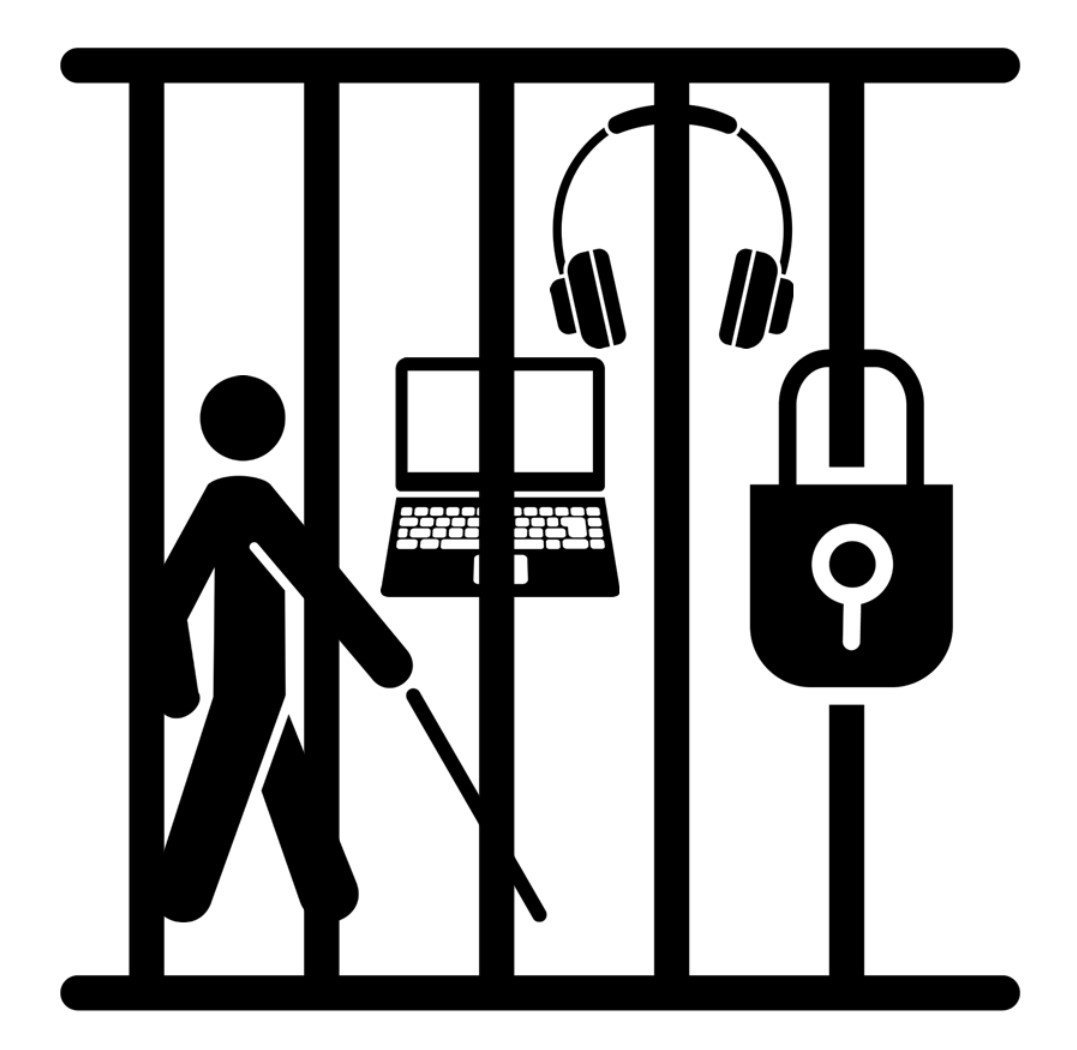Settlements bring key technology, other accommodations for Deaf, hard of hearing, and blind incarcerated people in Colorado
Amy Robertson, Partner, Fox & Robertson
When Brian Mackes wants to submit a grievance challenging prison conditions, contact the infirmary with his medical concerns, or write a letter to his lawyer, he has to dictate his words to a fellow prisoner* who writes them down and – he hopes – writes them legibly, spells them correctly, and keeps them in confidence. Zach Radford did not understand the teachers in his required therapeutic class and was eventually removed from the class for nonparticipation; he remained on the waiting list for other required classes while others were admitted. Mr. Mackes is blind; Mr. Radford is Deaf;** both are prisoners in the custody of the Colorado Department of Corrections (CDOC). Until now, CDOC has not provided the technology that would permit blind prisoners independent reading and writing, and has consistently failed to provide sign language interpreters for many crucial communications, including intake, medical appointments, and classes.
I have been privileged to represent both of them – along with a number of other courageous incarcerated people and two organizational plaintiffs – in separate cases under the Americans with Disabilities Act seeking effective communication and other accommodations for blind, Deaf, and hard of hearing people in the Colorado prison system. We recently settled both cases, bringing comprehensive reform and groundbreaking technological improvements that will allow our clients and others to understand and communicate in the stressful and dangerous prison environment and to more fully participate in programs that may help them move toward release.
In Disability Law Colorado v. Colorado Department of Corrections, our settlement secured broad access to sign language interpreters, both in person (with advance notice) and remotely (on demand) as well as on-demand captioning, more efficient repair and replacement of hearing aids, and text-based notifications of audible announcements and emergency alerts. We worked with the Civil Rights Clinic at the University of Denver Law School, as well as the Civil Rights Education and Enforcement Center (CREEC) and – as both client and co-counsel – Disability Law Colorado (DLC), our state’s Protection and Advocacy System. Although DLC was the only plaintiff, several dozen prisoners contributed to our research and 20 were named in the complaint as DLC’s Exemplar Constituents.
Image: icon showing blind person using cane, laptop, and headphones, all behind prison bars with a padlock.
The settlement in Mackes v. Colorado Department of Corrections requires the CDOC to provide blind people in its custody with laptops equipped with a screen reading program and loaded with accessible versions of all key print materials provided to sighted prisoners including prison handbooks and regulations, announcements, and forms. Blind incarcerated people will now be able to type their own documents, privately and securely. A printer and scanner will also be available in each living unit where a blind person is housed. The settlement also ensures more accessible work and educational programs. We represented Mr. Mackes and Adrian Chávez, blind men in CDOC custody, and organizational plaintiff National Federation of the Blind of Colorado, and co-counseled with CREEC as well as Eve Hill at Brown, Goldstein & Levy.
Working with organizational plaintiffs was crucial in both cases, both for the knowledge and experience each brought to its respective case, but also because this permitted us to avoid the exhaustion defense. Under the Prison Litigation Reform Act, an incarcerated plaintiff must exhaust the prison’s grievance process before filing suit, a cumbersome barrier to justice that is completely inaccessible to many of our blind or Deaf clients. This requirement only applies to incarcerated people, however; it does not apply to organizational plaintiffs.*** The organizational plaintiffs also permitted us to get comprehensive relief without the added step (and risk) of class certification.
Working with the Civil Rights Clinic was also essential to the success of our case on behalf of DHOH incarcerated people. Student lawyers powered the investigation, reviewing more than 50,000 pages of documents and conducting more than a hundred interviews. This permitted us to show with great specificity the breadth and systemic nature of CDOC’s ADA violations. Student lawyers also worked with several of our experts and then took the lead role in negotiations with the CDOC and the mediator presenting this highly technical information and securing important provisions in the settlement.
I strongly believe that settlement negotiations in both cases were successful because, during several key meetings, the lawyers got out of the way and let the experts and operational personnel speak directly to each other. When the CDOC’s lawyer insisted the ADA did not require what we were requesting, its chief ADA coordinator would often respond, “I think we can do that.” It’s hard, as a lawyer, not to react and push back when your opposing counsel stubbornly insists on being wrong about the law; it is our experience in quantitative and technology-centered ADA cases that it’s often best to shut up and hand the discussion to the experts.
Fox & Robertson is very interested in litigation at the intersection of disability and incarceration, and welcomes collaboration in similar cases.
*A word about words: in the prison law world, there is a good deal of discussion concerning how to refer to our clients: “prisoners”? “inmates”? “incarcerated people”? Definitely not “offenders” or “convicts.” It is my practice to refer to people as they themselves prefer. Based on input from my clients, I use both “prisoners” and “incarcerated people.”
**Another word about words: I capitalize “Deaf” because my clients who are completely unable to hear (“deaf”) are all culturally Deaf.
*** See, e.g., Dunn v. Dunn, 219 F. Supp. 3d 1163, 1166, 1176 (M.D. Ala. 2016) (holding Alabama’s Protection and Advocacy System had organizational standing and that the PLRA’s exhaustion requirement did not apply).


